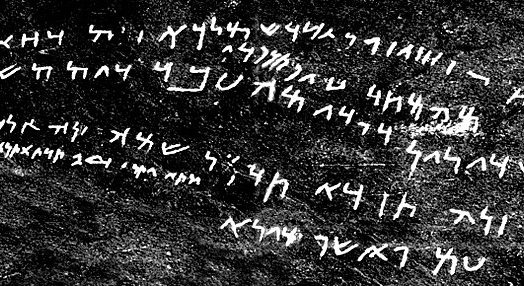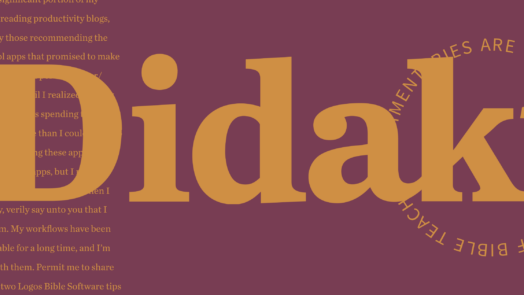The TDOT Aramaic Dictionary ships today.
I put some questions recently to John Meade and Peter Gurry regarding their newly launched Text and Canon Institute, based at Phoenix Seminary. In this interview, they discuss the impetus behind the Institute, the significance of textual criticism...
Textual criticism can explain some of the differences people notice between their English translations, such as the omission of “who walk not after the flesh, but after the Spirit” in the NIV of Romans 8:1 (compare Romans 8:1 in the KJV). However...
by Amy L. Balogh | University of Denver As a professor who teaches Hebrew Bible and Judaic studies courses across Colorado’s Front Range while also working at the University of Denver’s Center for Judaic Studies, my non-Jewish identity is a topic of...
Dr. Rod Mattoon (DMin, Bethany Theological Seminary) is the author of Treasures from the Scriptures (65 vols.), a massive exposition on almost the entire Bible. He has been preaching since 1972 and has served as a senior pastor since 1991. In this...
With a total of 14 talks from scholars throughout Israel and Canada, and over 60 people in attendance, this year’s Workshop on Biblical Hebrew Linguistics and Philology at the Hebrew University (HU) in Jerusalem was an all-around success. Cutting...
Logos Pro Dr. Mark Ward discusses common errors made in applying the biblical languages, and how a Logos course can help you avoid them (0:10), and Dr. Steve Runge discusses the importance of a small Greek particle (5:45). Learn how to use the...
Start learning Biblical Hebrew with Dr. Futato With this bundle, you’ll gain insight into Hebrew grammar, and learn all of the sounds and symbols of the alphabet—both the consonants and the vowels. Explore the forms of the noun, the...
The first time I attended SBL, back in November 2015, I was fortunate to be in company with eight other colleagues who also had papers accepted. My own was co-authored with Jeremy Thompson and was presented in the Biblical Hebrew and Lexicography...
A little knowledge can be a dangerous thing, especially when it comes to biblical words in the original Hebrew and Greek. Quite often preachers of God’s Word put too heavy a load on biblical words, expecting them to carry a major point of their...
We’ve had a few significant posts on the Dead Sea Scrolls on the blog in the last few weeks, including Craig Evans’s breaking news of the discovery of Cave 12, and then a follow-up post that asked the question of the importance of studying the...
A New Cave, an Old Controversy: Dramatic New Discovery in Israel will Re-Ignite Debates The last Dead Sea Scrolls cave, linked to the ruins on the marl shelf at the mouth of Wadi Qumran, was discovered in 1956, bringing the total number of caves to...
A Jewish proverb says, “Reading the Bible in translation is like kissing your bride through a veil.” You can still get the message, but there is something missing—you are more removed from the text. Learning Hebrew gets you closer to the text. It...
Learning the biblical languages can be very discouraging and frustrating. Studies and experience have shown that this is the most difficult aspect of theological training for students over the centuries. Many theologians have come to believe that a...
A clever and provocative author wrote something clever and provocative recently about Bible translation: We are accustomed to say things like “something got lost in the translation,” which it frequently does. But can anything ever be gained? Let me...
This post is by Josh Westbury, a scholar-in-residence at Faithlife. In addition to being a Hall of Fame baseball player, Yogi Berra is perhaps remembered most for his pithy witticisms, affectionately known as “Yogi-isms”. These short sayings often...
Some fans of Dr. Runge have claimed that his discourse works alone have made Logos worth it.
Language is a funny thing. A single word can have many meanings, and many words can describe a single concept. In our native tongue, we usually have a pretty good grasp on which words we can use to express certain thoughts and ideas. But when we...
You do and you don’t need Hebrew to understand the Old Testament. You don’t, because the Bible has already been translated into English. You do, because there are different levels of understanding: There’s your certified mechanic and your weekend...
John Calvin called the Psalms “an anatomy of all the parts of the soul,” meaning there is not a single emotion in all of life that is not articulated in the book of Psalms. When Dr. Mark Futato realized the Psalms’ broad relevance to all of...
Many pastors who attend seminary find that the traditional approach to learning Greek and Hebrew does not work for them. First-year courses usually focus on memorizing charts, paradigms, vocabulary, and more. The overwhelming amount of memorization...
Have you ever felt like the more you study the Biblical Languages, the more Greek and Hebrew you seem to forget? I felt that way, too, when I was first starting out. Today, I’ve completed my fourth semester of Greek and I’m currently in my fourth...
The Bible is the foundational text for all Christians. We read it, study it, and hear sermons on it, but many Christians don’t think about how we got it. We take for granted the 66 books—39 in the Old Testament and 27 in the New—that make up our...
One of our newest and most exciting projects is the Lexham High Definition Old Testament. We’re striving to help you understand the Old Testament’s original context and the intent of the authors—in a way that has never been done before...
It seems to be the common opinion that John Calvin was neither a master of Greek or Hebrew, yet he passionately perused them and encouraged and instructed all pastors to do the like. I find encouragement in the fact that Calvin wasn’t a master...
The Problem Few would deny the importance of learning Greek, Hebrew, and Aramaic for teaching and preaching. Despite this high view of the original languages, I’ve heard numerous pastors lament the limited practical payoff of investing...
The article—originally entitled A World without God (Bible Study Magazine, Nov–Dec 2011)— is written by Douglas Mangum. Douglas has an MA in Hebrew Bible from the University of Wisconsin-Madison and is a contributing editor at Logos. A world without...
I recently posted about the progress we’ve made on our The Lexham Greek-English Interlinear Septuagint (LXX), but that post was primarily about our progress. It didn’t really answer the question, “Why should I worry about...















